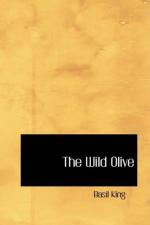“I only came,” she lisped to Strange, as they sat one day, under the parrot’s chaperonage, in the shady corner of the patio—“I only came because when dear mamma died there was nothing else for me to do. Everything happened so unfortunately, do you see? Mamma died, and my stepfather went blind, and really I had no home. Of course that doesn’t matter so much while I’m in mourning—I mean, not having a home—but I simply must go back to New York next autumn, in order to ‘come out.’”
[Illustration: “Who is Miriam?” was on his lips]
“Aren’t you ‘out’ enough already?”
“Do you see?” she began to explain, with the quaint air of practical wisdom he adored in her, “I’m not out at all—and I’m nearly nineteen. Dear mamma fretted over it as it was—and if she knew it hadn’t been done yet—Well something must be managed, but I don’t know what. It isn’t as if Miriam could do anything about it, though she’s a great deal older than I am, and has seen a lot of social life at Washington and in England. But she’s out of the question. Dear mamma would never have allowed it. And she’s no relation to me, besides.”
The question, “Who is Miriam?” was on his lips, but he checked it in time. He checked all questions as to her relatives and friends whom he did not know already. He was purposely making ignorance his bliss as long as possible, in the hope that before enlightenment could be forced upon him it would be too late for any one to recede.
“Couldn’t they do it for you here?” he asked, when he was sure of what he meant to say. “I know the Miss Martins—”
“Carrie and Ethel! Oh, well! That isn’t quite the same thing. I couldn’t come out in a place like Buenos Aires—or anywhere, except New York.”
“But when you’ve been through it all, you’ll come back here, won’t you?”
His eyes sought hers, but he saw only the curtains of the lids—those lids with the curious dusk on them, which reminded him of the petals of certain pansies.
“That’ll—depend,” she said, after a minute’s hesitation.
“It’ll depend—on what?” he persisted, softly.
Before she could answer the parrot interrupted, screaming out a bit of doggerel in its hoarse staccato.
“Oh, that bird!” the girl cried, springing up. “I do wish some one would wring its neck.”
He got no nearer to his point that day, and perhaps he was not eager to. The present situation, with its excitements and uncertainties, was too blissful to bring to a sudden end. Besides, he was obliged to go through some further rehearsing of the creed adopted in the dawn on Lake Champlain before his self-justification could be complete. It was not that he was questioning his right to act; it was only that he needed to strengthen the chain of arguments by which his action must be supported—against himself. Within his own heart there was something that pleaded against




